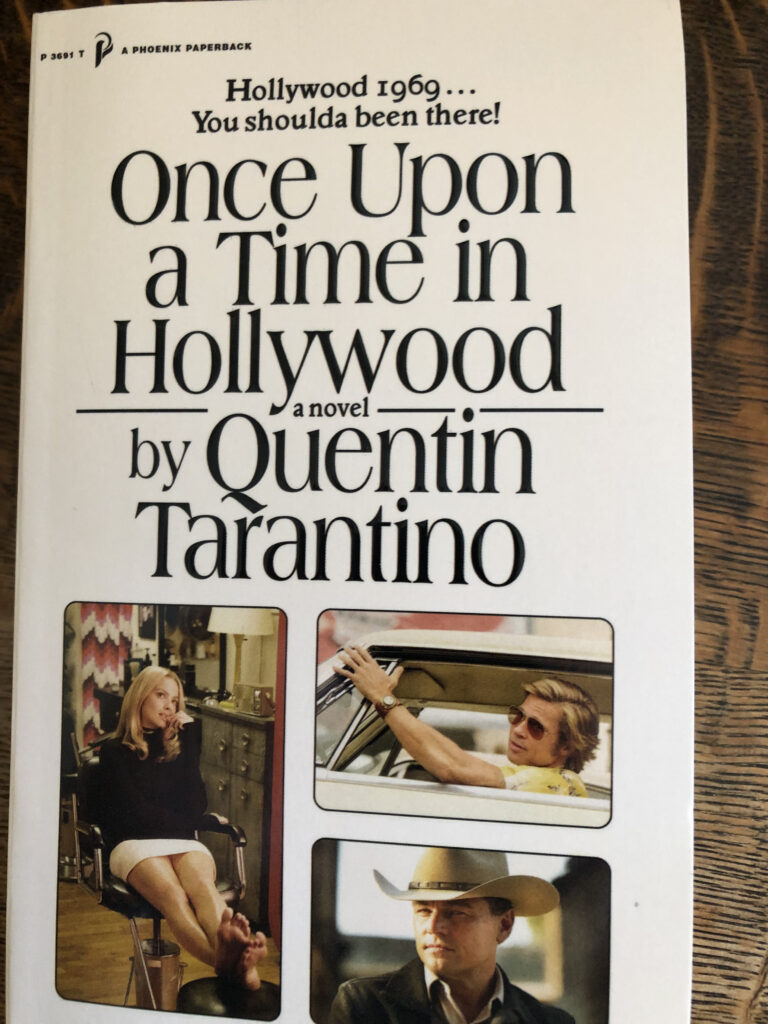It was 52 years ago today, August 9, 1969, that Charles Manson and his ‘family’ were responsible for the brutal murder of film star Sharon Tate and others at their homes in Hollywood. Fifty years later, Quentin Tarantino released his movie, Once Upon a Time in Hollywood, which includes Tate and her film director husband, Roman Polanski, among his cast of fictional characters. In the film, the ending is different, notably that Tate survives. (Sorry if you were thinking about watching it a little belatedly.) In his novelisation of the movie, which goes by the same title, Tarantino alters the ending again, albeit Sharon still makes it out the other side, which must be reassuring for her ghost.
The book has had some pretty good reviews, albeit mostly from people whose primary jobs are reviewing films – e.g. Peter Bradshaw of The Guardian and Tom Shone in the Sunday Times. But the thing is, on a film set Tarantino will have people making suggestions about what can be left out and also be aware that the running time needs to be considered. Here, his book seems to end when he’s had enough of it. Well, all that dialogue must be tiring to write. A lot of it is tiresome to read. This being Tarantino, sex is involved, but when ‘Pussycat’ gets mad at Cliff Booth (Brad Pitt in the movie) for suggesting she is under-age, her line – “Obviously I’m not too young to fuck you, but obviously you are too old to fuck me” – is about as concise as anything gets. Tarantino famously used to work in a video store and watched films endlessly, and here he duly name-checks a lot of stars and not-so-well-knowns. That takes time and space, too. In the end, it’s hard to see what this adds unless you think the movie is the best thing since his previous one and you need more stuff about the people in it.

The only connection between that book and this next one, Barcelona Dreaming by Rupert Thomson (shown on the home page), is that I read them one after the other. This one is half the length and about twice the value.
In fact it is really three books, with an overlapping theme of Barcelona and one character, Montse, who appears in all three sections: first as the friend of the chief protagonist, Amy; second as the divorced wife of a drunken jazz pianist and roué, Nacho; third as the publisher of books translated by Jordi. Amy embarks on a relationship with a Moroccan immigrant who has no official papers; Nacho bizarrely starts giving Spanish lessons to Ronaldinho, the Brazilian footballer who is the star of the Barcelona football team; Jordi falls in with a dodgy character whose real name might or might not be Vic who once tried to get Mireia, the woman whom Jordi wants to be his girlfriend, to appear in a porn film he was involved with. All clear so far?
Within the latter story, there is another book within the book: a novel Jordi is translating in which a married woman called Jeanne discovers her husband, Marc, is having an affair. She responds by sending gifts to his lover, Sophie. When Sophie eventually thanks Marc for his generosity, he of course has no idea what she’s talking about and assumes they must be from another admirer. She insists there is no one else. The nature of Jeanne’s presents soon changes and, as you might imagine, things do not end well. Ingenious, though.
At times the effects of Thomson’s story-telling are mesmerising and his evocation of Barcelona is frequently fabulous. But it is perhaps in keeping with this beguiling book that the denouement should occur not in Barcelona but on Piccadilly in London. It’s worth the read.
